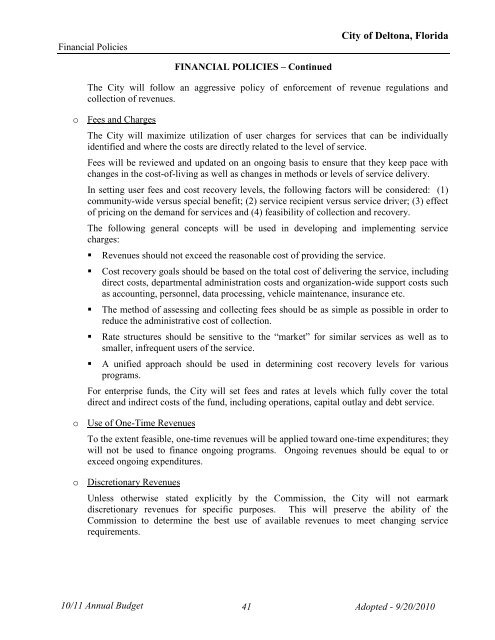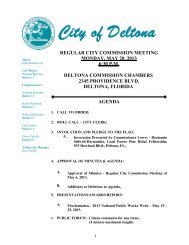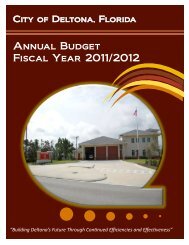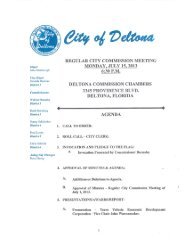CERTIFIED - City of Deltona, Florida
CERTIFIED - City of Deltona, Florida
CERTIFIED - City of Deltona, Florida
Create successful ePaper yourself
Turn your PDF publications into a flip-book with our unique Google optimized e-Paper software.
Financial Policies<br />
<strong>City</strong> <strong>of</strong> <strong>Deltona</strong>, <strong>Florida</strong><br />
FINANCIAL POLICIES – Continued<br />
The <strong>City</strong> will follow an aggressive policy <strong>of</strong> enforcement <strong>of</strong> revenue regulations and<br />
collection <strong>of</strong> revenues.<br />
o Fees and Charges<br />
The <strong>City</strong> will maximize utilization <strong>of</strong> user charges for services that can be individually<br />
identified and where the costs are directly related to the level <strong>of</strong> service.<br />
Fees will be reviewed and updated on an ongoing basis to ensure that they keep pace with<br />
changes in the cost-<strong>of</strong>-living as well as changes in methods or levels <strong>of</strong> service delivery.<br />
In setting user fees and cost recovery levels, the following factors will be considered: (1)<br />
community-wide versus special benefit; (2) service recipient versus service driver; (3) effect<br />
<strong>of</strong> pricing on the demand for services and (4) feasibility <strong>of</strong> collection and recovery.<br />
The following general concepts will be used in developing and implementing service<br />
charges:<br />
• Revenues should not exceed the reasonable cost <strong>of</strong> providing the service.<br />
• Cost recovery goals should be based on the total cost <strong>of</strong> delivering the service, including<br />
direct costs, departmental administration costs and organization-wide support costs such<br />
as accounting, personnel, data processing, vehicle maintenance, insurance etc.<br />
• The method <strong>of</strong> assessing and collecting fees should be as simple as possible in order to<br />
reduce the administrative cost <strong>of</strong> collection.<br />
• Rate structures should be sensitive to the “market” for similar services as well as to<br />
smaller, infrequent users <strong>of</strong> the service.<br />
• A unified approach should be used in determining cost recovery levels for various<br />
programs.<br />
For enterprise funds, the <strong>City</strong> will set fees and rates at levels which fully cover the total<br />
direct and indirect costs <strong>of</strong> the fund, including operations, capital outlay and debt service.<br />
o Use <strong>of</strong> One-Time Revenues<br />
To the extent feasible, one-time revenues will be applied toward one-time expenditures; they<br />
will not be used to finance ongoing programs. Ongoing revenues should be equal to or<br />
exceed ongoing expenditures.<br />
o Discretionary Revenues<br />
Unless otherwise stated explicitly by the Commission, the <strong>City</strong> will not earmark<br />
discretionary revenues for specific purposes. This will preserve the ability <strong>of</strong> the<br />
Commission to determine the best use <strong>of</strong> available revenues to meet changing service<br />
requirements.<br />
10/11 Annual Budget<br />
41 Adopted - 9/20/2010
















